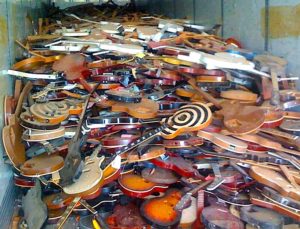
DON’T LET YOUR EGO DUMP YOUR MUSIC CAREER ON THE SLAG HEAP
I recently read a random Facebook post that reminded me of the thousands of conversations I’ve had with musicians over the years on the subject of “Why am I not more successful, when I am sooooo much better than sooooo many of the successful players out there?”
Obviously, the angst and frustration felt by less-than-successful musicians who very much prize their artistry is truly a sad condition for those suffering from a lack of public acknowledgement and financial reward. That Facebook post from a sick-and-tired player confirmed that some people still rage at the unfairness of life and the mercurial nature of the music business. Sigh.
Well, one of my missions at all the music brands I had the pleasure to lead was to help inspire and actively support musicians—even if that meant doling out some some tough love. (And I do love you all, you know!) So please consider the following points as a bit of a “Temperament Rescue” if you’re one of those players who feel your talents have been kicked to the curb by lesser artists than yourself.
DIDN’T YOU GET INTO GAME THIS FOR THE LOVE?
Yeah. That’s probably a lame statement. Of course you did. But I think some musicians undervalue the life-changing glories of playing an instrument and creating music. There’s no price tag on that benefit to your soul. You should strive to remember that whatever happens in the BUSINESS of music, your adoration for making music is a very awesome thing indeed. Financial success can come and go. Fame—the same. It’s no different for maintaining one’s artistic relevance. But the love of having a musical instrument in your hands, and the privilege of being able to create music with that instrument should never wane. This love is what separates the true believers from the dilettantes. If you find yourself hating the act of making music solely due to your success ratio, then you may not be in the right field to find your bliss. Be happy.
ARTISTRY IS SUBJECTIVE
Can anyone REALLY say they are “better” than another musician? As professionals, we rely on the support of an audience. As a result, it’s the AUDIENCE who will assess our skills and parse out our relative success or failure—or a message that we need to work harder to grab their collective ears. In other words, the artist’s opinion is nearly irrelevant. This doesn’t mean that a player shouldn’t have confidence in his or her abilities. You should. But having a baseline skill set and all the confidence in the world doesn’t automatically equate to gaining the support of people who will stream your tracks, follow your socials, and bestow you with fame and fortune. Again—the AUDIENCE decides your fate. And those folks can be wildly fickle and extremely picky about what seduces their interest. You have to serve the audience in ways that can crack their code and gain their trust, support, and enthusiasm. It is NOT about how you perceive yourself. And I’ll also dare to submit here that someone you and I might rate as a crappy player, but who has managed to develop a large and supportive community is someone who has something wonderful going on. Moaning about lesser players getting the “breaks” is not productive. It’s a much more positive endeavor to jettison your ego and try to find out WHY you’re not acquiring a community of eager listeners.
WE TEND TO BE RIGHT WHERE WE DESERVE TO BE
Like all parts of this life, anyone can suffer through bad breaks, failure, pain, and tragedy. But you must also accept that people with far worse luck than yourself—and also bearing almost monumentally more limited opportunities—sometimes achieve big things. Now, they may be superheroes, and perhaps you are far from a Superman or a Captain America. But people who achieve great success from “not a chance in hell” should be inspirational, because they prove that wonderful things can happen if you don’t give up. In my experience, people who loudly and publicly complain about a lack of success often didn’t COMMIT to success. They sabotaged themselves with fear, or excuses, or blame, or a poor work ethic, or any blather that absolved them of any responsibility in tanking their own careers. In the case of the Facebook rant that started me writing this post, the player’s lot in life was completely caused by the unfairness of the music business—that “less awesome” musicians stole his opportunities, his fame, his gigs, and his anticipated financial rewards. Think that way, and your position at the subterranean levels of musical failure is gonna be where you SHOULD be.
VIEW YOURSELF AS A PRODUCT, NOT A TALENT
You want to consider yourself the greatest guitarist of all time? Take a shot. At home, and all alone in your bedroom or garage, anything goes, right? There’s nothing wrong with daydreams and giddy musings of fantasy. But when you’re actively pursuing a career in music (or a career in anything for that matter), you need to leave the fairy tales at home, and assess your strengths and weakness within the context of the actual world at large. Again, core confidence aside, your opinion of yourself doesn’t matter to business people or an audience. What matters is if you can deliver a tangible product that brings value into people’s lives, a well as into the often bottom-line mentality of a music venue, a record company, a festival promoter, a manager, and so on. You need to SEE yourself as the product—it’s the very way that most business people will evaluate your chances of keeping their various operations afloat and/or healthy. You need to glow with VALUE. Not ego. Not misrepresentations. Not fantasies. Not bravado. Not lies and wishes and hopes. When you see yourself as the value in a business proposition, then it won’t matter if you think you are better—or worse—than other musicians, because your opinion of your own musical talent is NOT an asset. It’s simply an opinion—and, many times, a not-very-accurate product of pure ego. Burn that ego-driven mindset of “better than,” and create a solid business plan for the awesome product (the music!) that you alone represent. I’ll put it another way: Think like a CEO. Don’t think like an entitled and lazy musician who lives in a dream world expecting vast numbers of fans and business people to acknowledge your fabulous talent.
TOO TOUGH?
I don’t hit my laptop with a mission to hurt people’s feelings or make them feel small. I always want to help musicians achieve their goals and, yes, their dreams, as well. But throughout the many years I’ve labored in this wonderful music business, I’ve never been able to stomach egotists and/or dreamers who expect glory without a strategy, hard work, and an open, absorbing approach to the data at hand. Making music is a joy. Promoting music is brutally tough, fraught with danger, and it can devour confidence and commitment. And yet, making excuses about a lack of success—or pinning blame for your lot in life on lesser talents getting better breaks—is a fool’s errand. Unless you try to see things differently, you may be a broken, damaged, and angry person for years. Take responsibility. See what is true. Assess your benefits and acknowledge your limits and/or threats. Make a plan. Love the music. Enjoy the ride. To my thinking, the act of music making is simply too wonderful to cause someone eternal pain.



